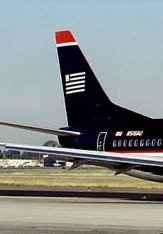State Refuses To Extend 90-Day Temporary License To Serve
 The State of New Mexico has drawn
its line in the Albuquerque sand, refusing to extend a 90-day
temporary liquor license to US Airways following several incidents
of serving alcohol onboard to intoxicated individuals, reported the
Associated Press.
The State of New Mexico has drawn
its line in the Albuquerque sand, refusing to extend a 90-day
temporary liquor license to US Airways following several incidents
of serving alcohol onboard to intoxicated individuals, reported the
Associated Press.
In November, passenger Dana Papst drove the wrong way on
Interstate 25, killing himself and five members of a New Mexico
family in a head-on collision. His blood alcohol level was four
times the legal limit.
According to reports, US Airways had served alcohol to Papst,
even though witnesses said he appeared to be intoxicated. Police
said Papst also bought beer at a Bernalillo, NM convenience store
after disembarking from his flight in Albuquerque.
Following the crash, department officials reviewed airline
liquor licenses, discovering US Airways was among several airlines
that lacked state licenses.
Since then, five airlines have submitted applications, and one
stopped serving alcohol on New Mexico flights, according to
department documents.
As ANN reported, the state
cited US Airways in January in connection with the Papst accident,
and prohibited the airline from serving liquor on New Mexico
flights until the airline received a state liquor license.
US Airways was granted a temporary 90-day license.
At a hearing on Monday, the head of the state Regulation and
Licensing Department sought assurances that US Airways was taking
steps to avoid serving alcohol to intoxicated passengers.
Said Santa Fe lawyer Michael Campbell, representing US Airways,
the airline has no intentions of sending drunken people out on the
roads of New Mexico.
Wednesday's decision came down one day before the temporary
license was set to expire.
"US Airways has done little, if anything, to consider
implementing the state's required alcohol server training to
identify alcohol impaired or intoxicated passengers," the state
Regulation and Licensing Department said in denying the
extension.
The airline said Wednesday it sent the department a letter
explaining that it plans to incorporate aspects of New Mexico's
liquor-server training program into its flight crew training
program. The state, however, had yet to receive the letter.
The Papst incident was not to be the only one involving US
Airways serving liquor to an intoxicated passenger. The state cited
the airline again last month for serving an intoxicated person
after the passenger was arrested at a DWI roadblock less than half
an hour after leaving Albuquerque's airport. He told authorities he
had been drinking at the Phoenix airport and on his US Airways
flight from Phoenix to Albuquerque. His blood-alcohol level was
.16, according to police, twice New Mexico's legal limit for
intoxication.
 Although Monday's
preliminary hearing was held to determine if in fact the airline
had submitted all the documentation for a permanent license, the
hearing was different in that it included others in addition to the
usual hearing officer and company officials, reported the Free New
Mexican.
Although Monday's
preliminary hearing was held to determine if in fact the airline
had submitted all the documentation for a permanent license, the
hearing was different in that it included others in addition to the
usual hearing officer and company officials, reported the Free New
Mexican.
In addition to department Superintendent Edward Lopez, those in
attendance included Gary Tomada, head of the department's Alcohol
& Gaming Division, the department's legal counsel, several
relatives of the people killed in the Papst crash, news reporters,
and four US Airways officials.
During the hearing, Lopez asked officials whether the airline
had incorporated any of New Mexico's alcohol-server training
materials into the airline's training program.
Lopez noted that the department had issued the airline a
temporary license after the airline's attorney wrote that the
airline was reviewing the state's training materials and might
incorporate portions of them into the company's training
materials.
US Airways Vice President Michael Minerva said the company
hadn't yet had a chance to incorporate any of the state's materials
because the airline trains new flight attendants in September;
there hasn't been a new class since the Papst crash, he said.
After reading aloud the state's training handbook about how to
manage intoxicated people who are intent on driving and how to
identify impairment and intoxication, Lopez said he had hoped the
airline would already have incorporated those sections of the
handbook.
To which Minerva responded: The airline is considering the
state's entire training program.
However, in a contrary response, US Airways attorney Campbell
later said, "Our training materials are, we believe, sufficient in
the recognizing and treatment of intoxicated persons."
When Lopez asked if the airline had done anything differently in
regard to alcohol-server training since the Papst crash, Campbell
said the airline had issued a notification about the subject of
intoxicated people.
Ray Collins Sr., father of Renee Collins-Gonzales, who was
killed in the Papst crash with her husband and three children, also
spoke at the hearing, challenging US Airways to not just comply
with minimal training standards for serving alcohol, but to set an
industry-wide example.
 Affordable Flying Expo Announces Industry MOSAIC Town Hall
Affordable Flying Expo Announces Industry MOSAIC Town Hall Classic Aero-TV: Composite-FX Sets Elevates the Personal Helicopter Market
Classic Aero-TV: Composite-FX Sets Elevates the Personal Helicopter Market Aero-News: Quote of the Day (10.25.25)
Aero-News: Quote of the Day (10.25.25) ANN's Daily Aero-Term (10.25.25): Ground Stop (GS)
ANN's Daily Aero-Term (10.25.25): Ground Stop (GS) NTSB Final Report: Gallow Daniel A Kitfox Classic IV
NTSB Final Report: Gallow Daniel A Kitfox Classic IV




